Webinar: Grant Writing Kickstarter – Tools & Strategies for the LGBTQ South!
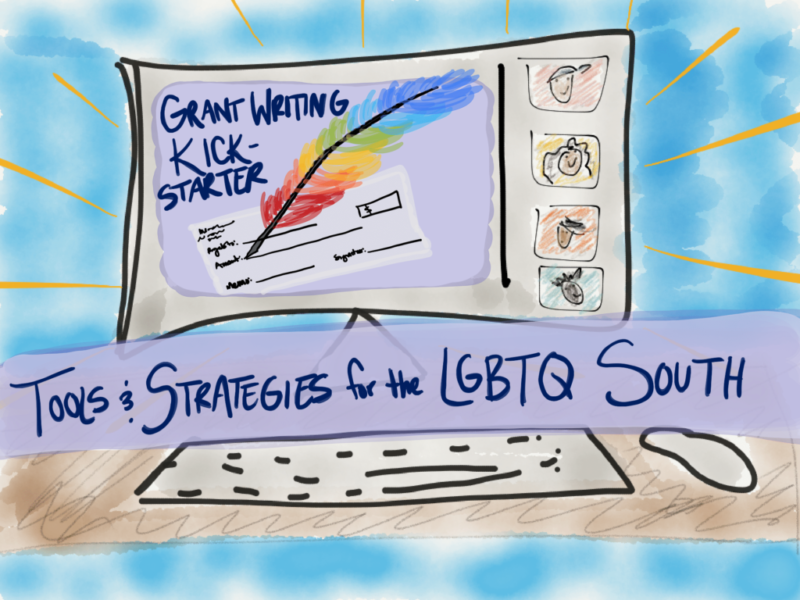
The webinar took place on November 13, 2018. Missed it? Scroll down to watch the full recording and download resources shared during the webinar.
Over the years, we’ve sat down with many of our partners to support them through process of writing grants, and now we’re excited to bring this support to our full network in the webinar “Grant Writing Kickstarter: Tools & Strategies for the LGBTQ South.”
Veteran grant writers from Campaign for Southern Equality (CSE) and Southerners on New Ground (SONG) shared their experiences with grant writing, discussed their most helpful tips and strategies, and provided coaching to webinar participants.
This webinar covered the fundamentals for how to effectively tell the story of your work, demystified the complex and confusing landscape of grant funding – especially that of LGBTQ funding in the South, and shared honest dialogue about how to weather the storm and not internalize rejection and critique.
Webinar Recording:
Resources:
Panelists:
English-only:
 Rev. Jasmine Beach-Ferrara, CSE
Rev. Jasmine Beach-Ferrara, CSE
Raised in North Carolina, Jasmine Beach-Ferrara is a minister in the United Church of Christ and Executive Director of the Campaign for Southern Equality. She lives in Asheville, NC, with her wife, Meghann, and their son. She writes fiction and has written widely about LGBTQ issues in the South. She also serves on Buncombe County Commission, where she focuses on policy issues related to early childhood education and equity.
Micah Blaise is an educator, organizer, and femme born & raised in rural South Carolina. She has been involved in feminist and anti-racist organizing in her home state for over ten years. Her professional background includes working as special education teacher with a radical agenda and serving as the first full-time staff person for the Carolina Youth Action Project. Today, Micah is a Development Coordinator with Southerners on New Ground. She is passionate about organizing resources to build power in the South and fundraising to support movement leaders fighting for a world where all of us can live Free from Fear. Micah is a Libra with a Virgo rising who loves making commitments, swimming in the ocean under the full moon, and being barefoot in the kitchen.
Webinar: Queer the Vote – Taking Back our Democracy!
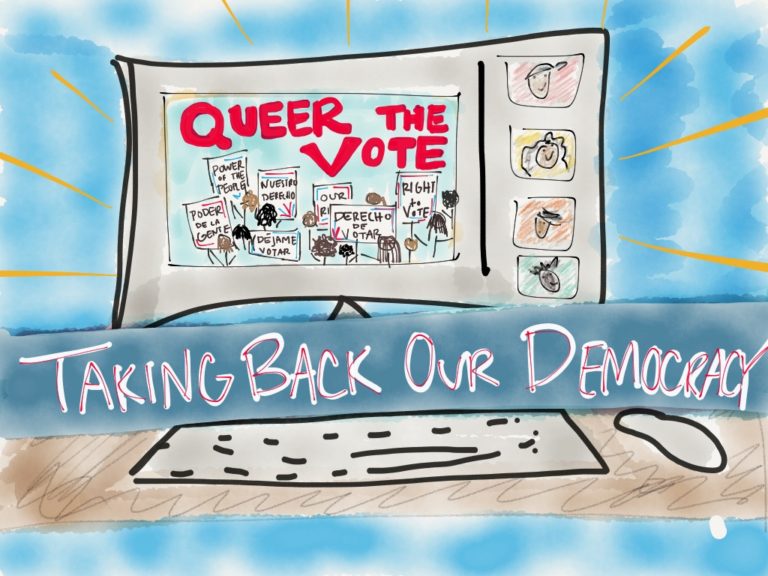
This webinar took place August 15, 2018. Missed it? Scroll down to watch the full recording and download resources shared during the webinar.
Voting in local, state and federal elections is part of how we can change policies to end local law enforcement’s collaboration with ICE. To end the practice of money bail. To pass local non-discrimination ordinances. To make our schools safer for trans and LGBQ students. To create living wage jobs. To increase access to quality and affordable healthcare. Now, more than ever, our votes matter. We know voting alone isn’t enough to create the world we want to live in, but it is a necessary part of the work.
This grassroots training webinar, “Queer the Vote: Taking Back our Democracy,” covers what groups can and can’t do around elections and how much much they can spend (with 501(c)3 funding); how to use existing resources to get people to the polls; and different strategies for how to target populations that have had lower turnout.
This webinar, along with our annual #QueerTheVote grant round, is part of our commitment to supporting grassroots groups across the South to mobilize voters through nonpartisan voter registration and turn out drives.
Webinar Recording:
Resources:
Presentation Slides – #QueerTheVote Webinar
New Voter Restriction Laws in the US South since 2011 – by state
Nonpartisan Voter Mobilization Resource Directory
Nonpartisan Voter Mobilization – Keeping It Legal
Panelists:
 Que Bell, The Knights &Orchid Society
Que Bell, The Knights &Orchid Society
Quentin “Que” Bell is a Black Trans activist, entrepreneur, and mentor born and raised in historic Selma, Alabama. Que received his Bachelor’s degree from Alabama State University in Business Administration with an Entrepreneurial Concentration. While at ASU in 2012, Que founded The Knights & Orchids Society a southern centered grassroots startup led by black, queer, transgender, and gender non-conforming people fighting at the intersections of racial and gender justice. Since 2012 Quentin’s goal remains unchanged, to improve the quality of life within the LGBTQ+ community by creating safe spaces that empower, educate, and unite Trans, GNC, & Queer role models of color. Que has dedicated his adult life to actively serving in leadership positions to help advance the fight for LGBTQ equality and inclusion while increasing visibility for Trans men of color.
 TC Caldwell, Coffeehouse Poets and The Knights & Orchids Society
TC Caldwell, Coffeehouse Poets and The Knights & Orchids Society
Traniesa “TC” Caldwell uses she/they pronouns. Poet activist. Grew up in the rural south. Believes in community. Founder of CoffeeHouse Poets and Creative Director for The Knights & Orchids Society.
Tori Wolfe-Sisson is a Co-Founder and Chief Operations Officer at BLK Pearl. BLK Pearl is a learning and leisure organization empowering Black, Brown, Indigenous, Transgender and Queer Women in the American South and Rural places around the Globe. Lead organizer of the largest protests and rallies in support of LGBTQ+ people and youth immigrants in Alabama this decade, Tori has been a bridge between movement moments. Equity for all is the vision they work to see each day from dusk to dawn. A proud wife to the brilliant Shanté Wolfe-Sisson, lovingly aloof parent to Whammie the cat, Tori enjoys painting with friends, horseback riding and trips to the driving range. Secretly they are a conference call comedian, dial 7 for details. (;
Webinar: Community Organizing & Grassroots Fundraising – A Match Made for Movement-building!
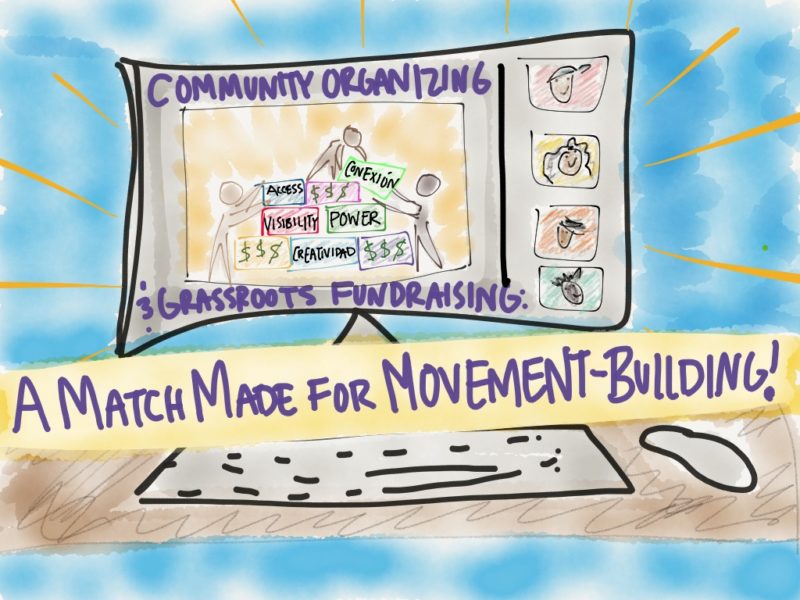
The webinar took place March 29, 2018. Missed it? Scroll down to watch the full recording and download resources shared during the webinar.
If we’ve learned one thing in our years of organizing across the LGBTQ South, it’s that there is a wealth of creative and inspiring grassroots leaders across the region – in rural areas, small towns, and big cities – working tirelessly to make lasting change in their hometowns. These same groups often fund their work out of their own pockets and face multiple barriers to accessing adequate funding for their work.
That’s why we partnered with the Grassroots Institute for Fundraising Training (GIFT), to host the webinar “Community Organizing & Grassroots Fundraising: A Match Made for Movement-Building,” the first installation of a pair of webinars about grassroots fundraising: the first webinar in English only and the second webinar in Spanish only. To learn more about the webinar in Spanish, click here.
This interactive and resource-packed free webinar explored how fundraising is inherently tied to the work of movement-building, how fundraising can be a form of radical self-empowerment, and provided a comprehensive introduction to grassroots fundraising – including crafting an annual fundraising plan and exploring different fundraising strategies.
Webinar recording:
Videos to watch along with the webinar:
The Biggest Myth About Vulnerability
How Leaders Harness the Power of Uncertainty
Weaving the Q’eswachaka Bridge
Resources:
Mapping Our Experiences: A Training Exercise
Creating an Organizational Fundraising Strategy: A Training Exercise
Fundraising Planning Worksheet
Sample Organizing Group Fundraising Plan
Making the Ask: Conversation Map
A Consumer’s Guide to Low-Cost Donor Management Systems
Fundraising 501(c)(3) Compliance Checklist & Resources (Southern States)
Facilitators:
Veronica Garcia
Program Director, Grassroots Institute for Fundraising Training (GIFT)
 Veronica was born in Los Angeles and raised on the U.S./Mexico border in El Paso, Texas where she is based today. She has over 20 years of experience working with social justice nonprofit organizations and community groups on issues including access to health care, food and housing, quality education, anti-violence initiatives, LGBTQ equity, economic justice, anti-racism, and immigrant rights.
Veronica was born in Los Angeles and raised on the U.S./Mexico border in El Paso, Texas where she is based today. She has over 20 years of experience working with social justice nonprofit organizations and community groups on issues including access to health care, food and housing, quality education, anti-violence initiatives, LGBTQ equity, economic justice, anti-racism, and immigrant rights.
Veronica is deeply committed to using the power of fundraising as a movement building strategy. She learned and internalized this powerful value as a graduate of GIFT’s Staff-in-Training Internship Program over 10 years ago. In the years since graduating from GIFT’s training program, Veronica has supported numerous community groups and organizations in building their grassroots fundraising capacity. Veronica also more recently helped launch two local community projects: the Detained Migrant Solidarity Committee and the Paso del Norte OUT Fund, a grantmaking initiative of El Paso’s LGBTQA community (lesbian, gay, bisexual, transgender, and queer people, and our allies).
Britney Nesbit
Southern Equality Fund Coordinator, CSE

Britney hails from Charleston, South Carolina and is a proud University of South Carolina alum. Since 2013, she has worked as an LGBTQ rights advocate and racial justice activist. Britney leads racial equity trainings and LGBTQ sensititvity workshops as part of her community organizing work for the Black Freedom Movement. She serves as Program Coordinator of the Southern Equality Fund, CSE’s grantmaking initiative.
Maya Avery Washington
Tzedek Social Justice Fellow for Engagement and Operations, CSE

Maya Avery Washington is a black, queer, woman from Atlanta, Georgia. Before moving to Asheville she was apart of the planning committee of the National Conference of Black Mayors Convention in Cali, Colombia, a Black Studies student at Georgia State University and a supportive ally to various grassroots organizations in the South. She believes in collective, intersectional liberation with a focus on reproductive justice. She values the power of intergenerational and ancestral work, creativity, and working towards an environmentally minded world. Maya’s passions lie in building bridges with accomplices of all ages, abilities, races, sexualities, socioeconomic backgrounds and genders by creating warm, safe spaces where folks can convene, create and build emotional support systems.
Maya currently works as the Tzedek Social Justice Fellow for Engagement and Operations for the Campaign for Southern Equality. Her duties include assisting with event planning and administrative support around fundraising. After Tzedek, she has professional dreams of assisting nonprofits in adopting cutting edge fundraising and mindful accessibility techniques. Her personal future lies in planning for the future of autonomous healing, living and growing space for black and brown queer folks.
About G.I.F.T.
Founded in 1996, the Grassroots Institute for Fundraising Training (GIFT) isa multiracial organization that promotes the connection between fundraising, social justice and movement-building. GIFT builds the capacity of nonprofit organizations to raise money and develop healthy, diverse, and sustainable fundraising programs. We believe that how groups are funded is as important to achieving their goals as how the money is spent, and that building community support is central to long-term social change.
GIFT trains 300+ organizations each year, and specializes in training organizations with budgets below $1 million, especially those working for social justice and those based in communities of color. GIFT’s training, capacity building, and consulting services seek to develop and strengthen the fundraising knowledge and skills of grassroots fundraisers, increase the capacity of organizations to integrate fundraising with programmatic work, and develop effective grassroots fundraising plans.
Webinar: Funding for Grassroots Change
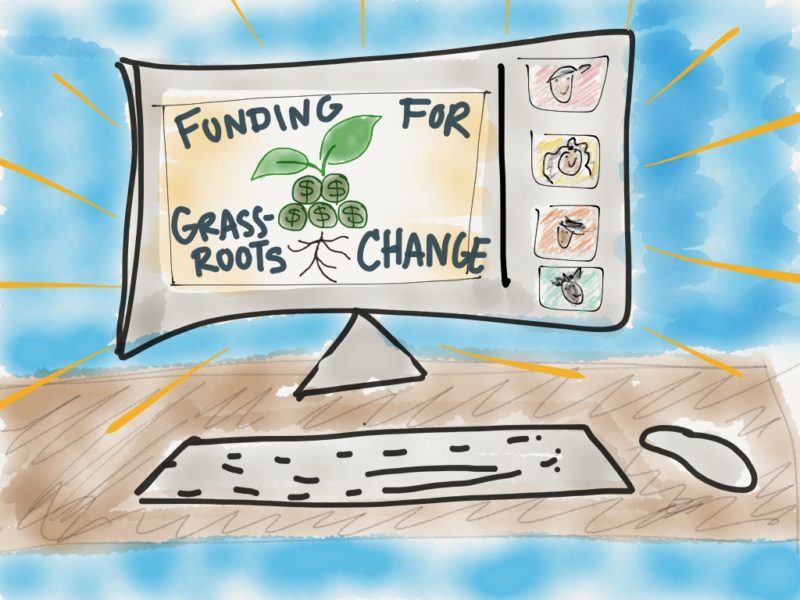
Some of the most visionary work in the South is often planned at the dinner table and funded out-of-pocket by grassroots leaders. These leaders sacrifice their time money, health and safety to make change in their home towns. Grassroots LGTBQ leadership is crucial to achieving lived and legal equality in the South, but it is also severely underfunded and undervalued.
We were humbled to partner with the Astraea Lesbian Foundation for Justice, Out in the South Initiative, Fund for Trans Generations, Third Wave Fund, and Trans Justice Funding Project to host the webinar, “Funding for Grassroots Change,” that took place on Tuesday July 11, 2018.
This free webinar provided LGBTQ grassroots organizers across the South with the opportunity to directly connect with a panel of funders that prioritize Southern LGBTQ grassroots leadership, and to learn how to access more funding for their work. Panelists shared info about their respective funds and application processes, how to navigate the often-times mystifying world of funding, where resources are going in the South, and why it’s paramount to prioritize work led by trans people and people of color.
Missed the webinar? Watch the full recording below.
Webinar Visuals:
Download the main webinar powerpoint presentation.
Download the Out in the South Initiative powerpoint presentation.
Webinar Resources & Links:
Astrea Lesbian Foundation for Justice
Borealis Philanthropy – Fund for Trans Generations
Central Alabama LGBTQ Fund – Small Grant Cycle
Click here to see more funding opportunities.
Panelists:
Chantelle Fisher-Borne, Out in the South Initiative, Funders for LGBTQ Issues
Gabriel Foster, Trans Justice Funding Project
Joy Messinger, Third Wave Fund
Miabi Chatterji, Astraea Lesbian Foundation for Justice
Ryan Li Dahlstrom, Fund for Trans Generations, Borealis Philanthropy
Webinar: LGBTQ in the South – Telling Your Story with Data
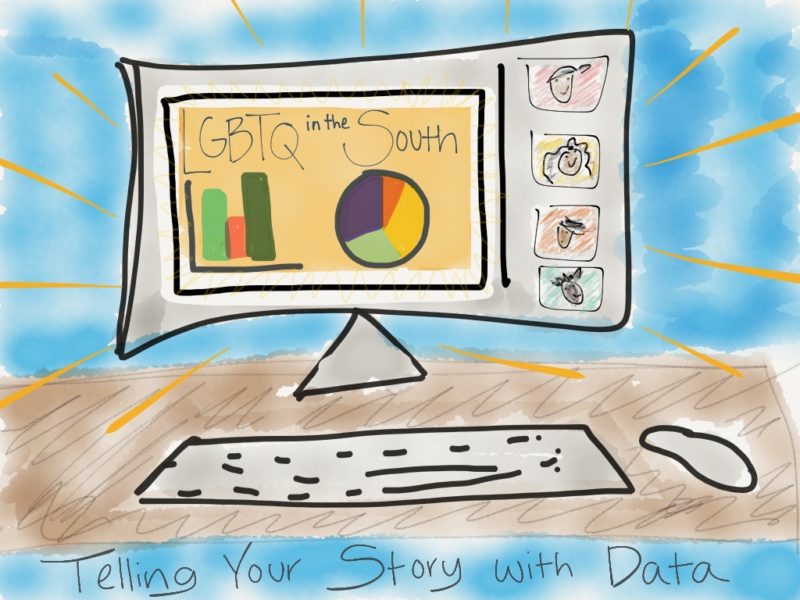
Data can be a powerful storytelling tool, yet historically there has been a lack of reliable statistics about LGBTQ Southerners.
Thanks to the Williams Institute, that’s changing. We now have a growing body of data telling an important and multi-layered story about LGBTQ Southerners – that ⅓ of all LGBTQ people in our country live in the South, that LGBTQ Southerners are more likely to be people of color, low-income, and raising families than in any other region in the U.S., and that there are more new HIV infections among men who have sex with men in the South than in any other region.
On May 18, 2017, we held the webinar “LGBTQ in the South – Telling Your Story with Data,” in partnership with Christy Mallory of the Williams Institute. The Williams Institute is a think tank at UCLA Law that generates independent and relevant research on sexual orientation and gender identity.
The webinar provided grassroots leaders with an overview of who LGBTQ Southerners are, the issues they face, and how to find specific data about their local communities using the Williams Institute online resources. CSE’s Communications Director, Aaron Sarver, presented on how to effectively use data in your communications strategy, and Ivy Gibson-Hill and Fletcher Page with the GenderBenders in Greenville, SC shared new ways they are using data to tell the story of their work to funders and supporters.
Missed the webinar? You can watch the full discussion below.
Webinar Visuals:
Download Williams Institute Presentation
Download Webinar Overview Presentation
Click here to view the Communications Strategy Prezi
Data Sources:
- The Williams Institute
- 2015 US Transgender Survey
- Center for Disease Control and Prevention (HIV/AIDS)
- Center for American Progress
- Out in the South Initiative, Funders for LGBTQ Issues
Co-Panelists:
Christy Mallory, The Williams Institute
Aaron Sarver, Campaign for Southern Equality
Ivy Gibson-Hill, GenderBenders and Campaign for Southern Equality
Fletcher Page, GenderBenders and Campaign for Southern Equality
Applying for 501c3 Status
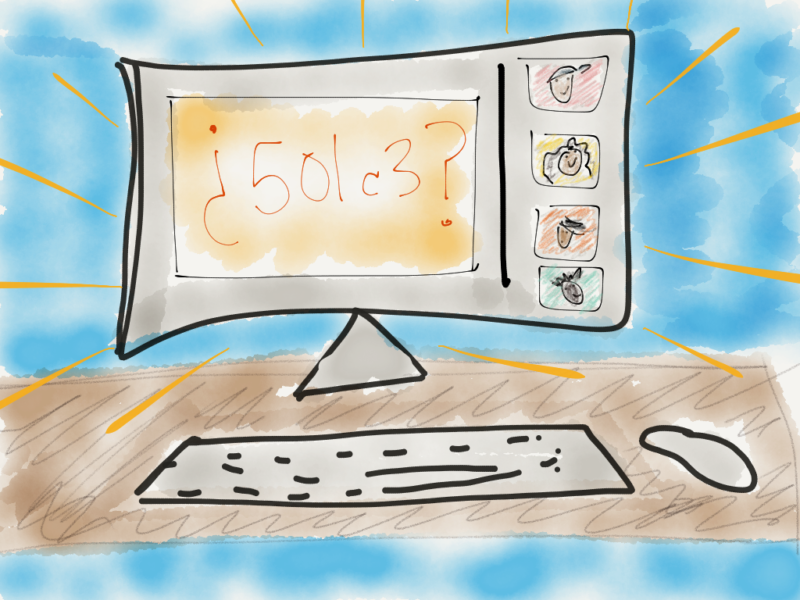
When it comes to seeking funding, one of the most common barriers grassroots leaders face is the lack of nonprofit status. Most foundations supporting LGBTQ work in the South require that groups have 501c3 status or a fiscal sponsor.
Having 501c3 status isn’t necessarily the end-all-be-all for many grassroots groups, neither is it the best vehicle for much of the incredible work happening across the South. But for many groups, especially groups that are working toward becoming a reliable and long-term resource for their community, it’s a logical next step.
On February 21, we held a webinar giving an overview of what it means to have 501c3 status, what are the other options available, and what are the steps to apply. The webinar began by looking at the advantages and disadvantages of seeking 501c3 nonprofit status. The group also discussed all the steps involved in becoming a 501c3, including a question and answer session with Southern LGBTQ leaders who have recently secured their 501c3 status.
Missed the webinar? You can watch the full discussion below. You can also click here to download the PDF of the presentation.
Additional Resources:
View examples of 990s on www.guidestar.org
IRS 501c3 Requirements and Steps





